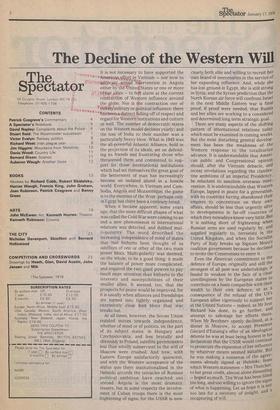The Decline of the Western Will
It is not necessary to have supported the AmeriaanAfkg.t irj,Vietnam — nor now to acitbc6t1„arfnecr iniervention in Angola either by tliJnited States or one or more of her allies — to feel alarm at the current contrdction of Western influence around the globe. Nor is the contraction one of met4lytmilitary or political influence: there has been.a distinct falling off of respect and regard for Western institutions and culture as well. The number of democratic states on the Western model declines yearly; and the loss of • India to their number was a particularly heavy blow. What in 1945 was the all-powerful Atlantic Alliance, bold in the projection of its ideals, set on defending its friends and frustrating those who threatened them and committed to support for those international institutions which had set themselves the great goal of the betterment of man has increasingly become an isolated island in a hostile world. Everywhere, in Vietnam and Cambodia, Angola and Mozambique, the game is to the enemies of the West: perhaps only in Egypt has there been a contrary trend.
When it became apparent, some years ago, that the more difficult phases of what was called the Cold War were coming to an end a new phenomenon in international relations was detected, and dubbed multi-polarity. The word described the increasing independence of mind of states that had hitherto been thought of as satellites of one or other of the two main power blocs. Multi-polarity was deemed, on the whole, to be a good thing: it made the balanCe of power more complicated, and required the two giant powers to pay much more attention than hitherto to the interests and susceptibilities of their smaller allies. It seemed, too, that the prospects for peace would be improved, for it is usually when alliances and friendships are turned into tightly organised and excessively close knit blocs that war breaks out.
At all times, however, the Soviet Union resisted moves towards independence, whether of mind or of politics, on the part of its subject states: in Hungary and Czechoslovakia, and less brutally and obviously in Poland, satellite governments less than wholly subservient to the will of Moscow were crushed. And now, with Eastern Europe satisfactorily quiescent, and with the Western .acceptance of the status quo there institutionalised in the Helsinki accords the tentacles of Russian political ambition have reached out abroad. Angola is the most dramatic theatre, but in some' respects the involvement of Cuban troops there is the most frightening of signs, for the USSR is now clearly both able and milling to recruit her own brand of mercenaries in the service of her expanding influence. And, while she has lost ground in Egypt, she is still strong in Syria; and the Syrian prediction that the North Korean air force will confront Israel in the next Middle Eastern war is final proof, if proof were needed, that Russia and her allies are working to a considered and determined long term strategic goal.
There are many aspects of the shifting pattern of international relations today which must be examined in coming weeks.
But the most disturbing general develdPment has been the weakness of the Western response to the totalitarian advance. It is understandable that American public and Congressional opinion should, after the Vietnam debacle, and recent revelations regarding the clandestine ambitions of an imperial PresidencY, be reluctant to sanction overseas inter vention. It is understandable that Western Europe, lapped in peace for a generation, with its countries having abandoned their empires to concentrate on their own affairs, should be less than urgently alive to developments in far-off countries of which they nowadays know very little. But it is nothing short of frightening when, . Russian arms are used regularly by, and supplied regularly to, terrorists in the United Kingdom, and when the Socialist Party of Italy breaks up Signore Moro 5 coalition government because he declined to invite the Communists to enter it. Even the gmerican commitment to the defence of Europe, originally and still the strongest of all post-war undertakings, 15 bound to weaken in the face of a clear unwillingness by the European states to contribute on a basis compatible with their wealth to their own defence; or as ,a consequence of the refusal of the US s European allies vigorously to support her at the United Nations — indeed, as Mr Ivor Richard has done, to go further, and attempt to sabotage her efforts there. When Mr Brezhnev openly declined, at a dinner in Moscow, to accept President Giscard d'Estaing's offer of an ideologici détente he was at least being honest in his declaration that the USSR would continue to prosecute the expansion of her influence by whatever means seemed suitable. But he was making a nonsense of the agreements already signed at Helsinki, from which Western statesmen — Mrs Thatcber, to her great credit, almost alone dissentrn. — hoped so much. The West has been blind too long, and too willing to ignore the.signs of what is happening. Let us hope it is nuta too late for a recovery of insight, and recapturing of will.


























 Previous page
Previous page